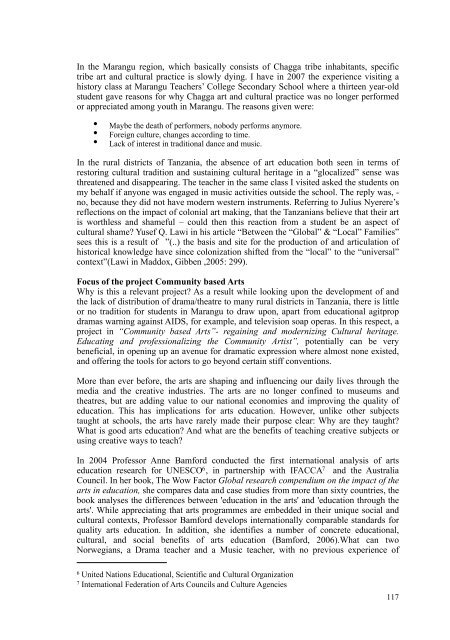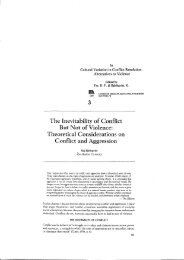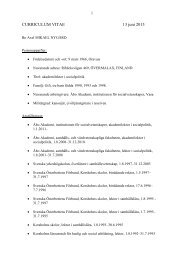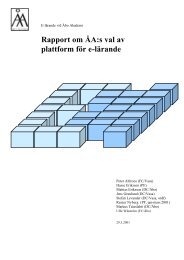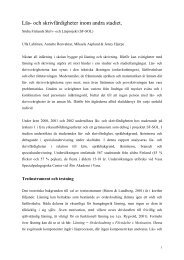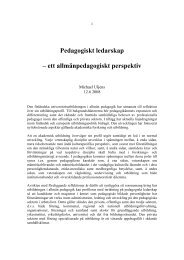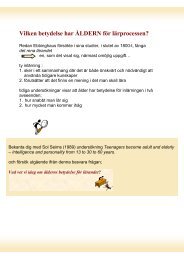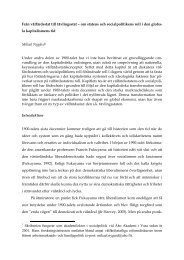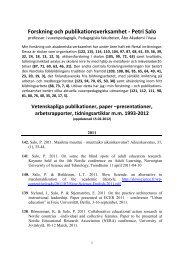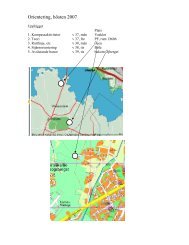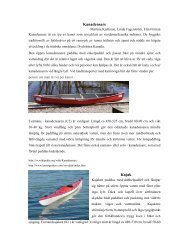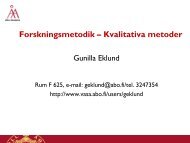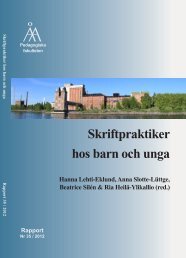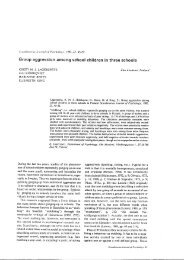Drama Boreale - Åbo Akademi
Drama Boreale - Åbo Akademi
Drama Boreale - Åbo Akademi
Create successful ePaper yourself
Turn your PDF publications into a flip-book with our unique Google optimized e-Paper software.
In the Marangu region, which basically consists of Chagga tribe inhabitants, specific<br />
tribe art and cultural practice is slowly dying. I have in 2007 the experience visiting a<br />
history class at Marangu Teachers’ College Secondary School where a thirteen year-old<br />
student gave reasons for why Chagga art and cultural practice was no longer performed<br />
or appreciated among youth in Marangu. The reasons given were:<br />
• Maybe the death of performers, nobody performs anymore.<br />
• Foreign culture, changes according to time.<br />
• Lack of interest in traditional dance and music.<br />
In the rural districts of Tanzania, the absence of art education both seen in terms of<br />
restoring cultural tradition and sustaining cultural heritage in a “glocalized” sense was<br />
threatened and disappearing. The teacher in the same class I visited asked the students on<br />
my behalf if anyone was engaged in music activities outside the school. The reply was, -<br />
no, because they did not have modern western instruments. Referring to Julius Nyerere’s<br />
reflections on the impact of colonial art making, that the Tanzanians believe that their art<br />
is worthless and shameful – could then this reaction from a student be an aspect of<br />
cultural shame? Yusef Q. Lawi in his article “Between the “Global” & “Local” Families”<br />
sees this is a result of ”(..) the basis and site for the production of and articulation of<br />
historical knowledge have since colonization shifted from the “local” to the “universal”<br />
context”(Lawi in Maddox, Gibben ,2005: 299).<br />
Focus of the project Community based Arts<br />
Why is this a relevant project? As a result while looking upon the development of and<br />
the lack of distribution of drama/theatre to many rural districts in Tanzania, there is little<br />
or no tradition for students in Marangu to draw upon, apart from educational agitprop<br />
dramas warning against AIDS, for example, and television soap operas. In this respect, a<br />
project in “Community based Arts”- regaining and modernizing Cultural heritage.<br />
Educating and professionalizing the Community Artist”, potentially can be very<br />
beneficial, in opening up an avenue for dramatic expression where almost none existed,<br />
and offering the tools for actors to go beyond certain stiff conventions.<br />
More than ever before, the arts are shaping and influencing our daily lives through the<br />
media and the creative industries. The arts are no longer confined to museums and<br />
theatres, but are adding value to our national economies and improving the quality of<br />
education. This has implications for arts education. However, unlike other subjects<br />
taught at schools, the arts have rarely made their purpose clear: Why are they taught?<br />
What is good arts education? And what are the benefits of teaching creative subjects or<br />
using creative ways to teach?<br />
In 2004 Professor Anne Bamford conducted the first international analysis of arts<br />
education research for UNESCO 6 , in partnership with IFACCA 7 and the Australia<br />
Council. In her book, The Wow Factor Global research compendium on the impact of the<br />
arts in education, she compares data and case studies from more than sixty countries, the<br />
book analyses the differences between 'education in the arts' and 'education through the<br />
arts'. While appreciating that arts programmes are embedded in their unique social and<br />
cultural contexts, Professor Bamford develops internationally comparable standards for<br />
quality arts education. In addition, she identifies a number of concrete educational,<br />
cultural, and social benefits of arts education (Bamford, 2006).What can two<br />
Norwegians, a <strong>Drama</strong> teacher and a Music teacher, with no previous experience of<br />
6 United Nations Educational, Scientific and Cultural Organization<br />
7 International Federation of Arts Councils and Culture Agencies<br />
117


